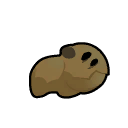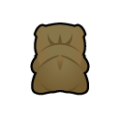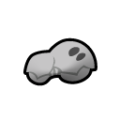Barkskin dryad
| This article relates to content added by Ideology (DLC). Please note that it will not be present without the DLC enabled. |
Barkskin dryad
A dryad caste specialized in absorbing hits during combat. Barkskin dryads are covered by a thick bark-like hide which is partly formed by the Gauranlen tree itself. Under human influence, it can act as a damage-absorbing fighter.
In general, dryads are mammal-like creatures that have a symbiotic relationship with the Gauranlen tree. They reproduce together with their tree, which contains a hidden dryad queen. Dryads can morph into various specialized castes.
Base Stats
Armor
- Armor - Sharp
- 70%
- Armor - Blunt
- 40%
Pawn Stats
- Move Speed
- 3.2 c/s
- Health Scale
- 90% HP
- Body Size
- 0.65
- Mass - Baby
- 7.8 kg
- Mass - Juvenile
- 19.5 kg
- Mass - Adult
- 39 kg
- Carrying Capacity
- 49
- Filth Rate
- 1
- Diet
- none
- Life Expectancy
- 80 years
- Coastal Animal
- false
- Manhunter Chance
- 100%
- Manhunter Chance (Taming)
- 0%
- Trainable Intelligence
- Intermediate
- Available Training
- Guard, Attack
- Wildness
- 0%
- Toxic Resistance
- 100%
- Toxic Environment Resistance
- 0%
- Comfortable Temp Range
- -50 °C – 50 °C (-58 °F – 122 °F)
Production
- Meat Yield
 4 immature dryad meat
4 immature dryad meat
Melee Combat
- Attack 1
- Front left paw
8 dmg (Scratch)
12 % AP
2 second cooldown
Stun for 280 ticks (4.67 secs) on first strike - Attack 2
- Front right paw
8 dmg (Scratch)
12 % AP
2 second cooldown
Stun for 280 ticks (4.67 secs) on first strike - Attack 3
- Teeth
9 dmg (Bite)
13 % AP
2 second cooldown
0.9 chance factor
Stun for 280 ticks (4.67 secs) on first strike - Attack 4
- Head
4 dmg (Blunt)
6 % AP
2 second cooldown
0.2 chance factor - Average DPS
- 2.5854
- tradeTags
- AnimalDryad
Barkskin dryads are a caste of Dryads, a type of animal added by the Ideology DLC. Slow but tough, the barkskin dryad soaks hits for your other fighters.
Summary[edit]
All dryads, including the barkskin dryad, are produced by a gauranlen tree. They have no need to eat, are immune to disease events, and have 100% Toxic Resistance, rendering them immune to Toxic fallout and Toxic buildup. Dryads cannot die from blood loss, so in practice will survive virtually any damage that doesn't immediately kill them. Dryads can retreat to a healing pod in order to regenerate wounds; this takes 3 days and heals all permanent injuries and bad conditions.
Attacks[edit]
Barkskin dryads are fairly weak combatants. Even with their amazing armor, they are roughly on par with most dogs as individual fighters.
| Melee Attacks | Damage Amount | Cooldown |
|---|---|---|
| Scratch | 8 | 2.0 sec |
| Bite | 9 | 2.0 sec |
| Blunt | 4 | 2.0 sec |
Barkskin dryads have similar armor to a thrumbo (with more Sharp armor), but they don't quite compare - dryads have a health scale of 0.9, similar to a human and over 8x less than a proper thrumbo.
Compared to the more common grizzly bear, barkskin dryads have 36% as much raw health. Considering that even a standard steel knife has around 18% armor penetration, armor boosts this by much less than you'd expect. Against such mediocre weapons, a barkskin dryad can be expected to have about 42% as much health as a grizzly, with this figure only getting worse against stronger foes and weapons.
Analysis[edit]
Barkskin dryads do one thing well: tank hits for your colonists. While your pawns fire from a distance, barkskin dryads can face enemy attacks. Thanks to the unique properties of dryads, they can heal up permanent injuries in 3 days, and don't need immediate tending, making them very cheap blocking animals. Barkskins will also engage enemies in melee, which means that they won't be firing their gun. Friendly fire is a possibility, but barkskins are small (avoiding melee hits and having a 67% modifier to shooting accuracy), and they can be used as direct cover.
As far as blocking animals go, however, the biggest detriment of barkskin dryads is that they lack advanced training and cannot be zoned to specific tiles; they can only be assigned to a handler and released to generally charge towards and attack an enemy. This significantly lessens their value for taking on infestations and other close-quarters combat situations where you want something to reliably stand between hostiles and your own colonists, like at a chokepoint. Mediocre DPS results in long fights and also means that your average barkskin dryad takes a *lot* of damage before it can take out something hostile. While they can be great disposable distractions to buy time for the cavalry to arrive, barkskins are not primary colony defense material.
Training[edit]
This animal can be trained as follows:
| | |
| | |
| | |
| |
*As of version 1.1.2610, all animals can be tamed. The percentage of likelihood of success depends on factors such as the Animals Wildness Percentage, Pawn Handling Skill, and others. More information can be found on the animals page.
Barkskin dryads spawn fully trained in Guard and Attack and have no training decay.
Health[edit]
Body parts[edit]
The body part table is collapsed due to length. Expand to view.
| Part Name | Health | Quantity | Coverage[1] | Target Chance[2] | Subpart of | Internal | Capacity[3] | Effect if Destroyed/Removed |
|---|---|---|---|---|---|---|---|---|
| Body | 36 | 1 | 100% | 21% | N/A[4] | - | Death | |
| Tail | 9 | 1 | 7% | 7% | Body | - | - | |
| Spine | 22.5 | 1 | 3% | 3% | Body | Moving |
−100% Moving[5] | |
| Stomach | 18 | 1 | 3% | 3% | Body | Digestion |
−50% Digestion | |
| Heart | 13.5 | 1 | 3% | 3% | Body | Blood Pumping |
Death | |
| Lung | 13.5 | 2 | 3% | 3% | Body | Breathing |
−50% Breathing. Death if both lost. | |
| Kidney | 13.5 | 2 | 3% | 3% | Body | Blood Filtration | −50% Blood Filtration. Death if both lost. | |
| Liver | 18 | 1 | 3% | 3% | Body | Digestion |
Death | |
| Neck | 22.5 | 1 | 20% | 5% | Body | Eating Talking Breathing |
Death | |
| Head | 22.5 | 1 | 75% | 2.25% | Neck | - | Death | |
| Skull | 22.5 | 1 | 25% | 1.125% | Head | - | Cannot be destroyed Increasing Pain based on damage. | |
| Brain | 9 | 1 | 70% | 2.625% | Skull | Consciousness |
Death Damage always results in scarring. | |
| Eye | 9 | 2 | 12% | 1.8% | Head | Sight |
−25% Sight. −100% if both lost. Damage always results in scarring. 0% Hit Chance against Blunt damage. | |
| Ear | 10.8 | 2 | 8% | 1.2% | Head | Hearing |
−25% Hearing. −100% if both lost. | |
| Nose | 9 | 1 | 10% | 1.5% | Head | - | - | |
| AnimalJaw | 9 | 1 | 10% | 1.5% | Head | Manipulation |
−100% Manipulation. Can no longer use Bite attack. | |
| Front Leg | 27 | 2 | 7% | 5.95% | Body | Moving |
−25% Moving. −50% if both lost. Can no longer use paw attack.[6] | |
| Front Paw | 9 | 2 | 15% | 1.05% | Front Leg | Moving |
−25% Moving. −50% if both lost. Can no longer use paw attack. | |
| Rear Leg | 27 | 2 | 7% | 5.95% | Body | Moving |
−25% Moving. −50% if both lost. | |
| Rear Paw | 9 | 2 | 15% | 1.05% | Rear Leg | Moving |
−25% Moving. −50% if both lost. |
- ↑ Coverage determines the chance to hit this body part. It refers to the percentage of the super-part that this part covers, before its own sub-parts claim their own percentage. For example, if the base coverage of the super-part is 100%, and the coverage of the part is 20%, 20% of hits would hit the part, and 80% the super-part. If the part had its own sub-part with 50% coverage, the chances would be 10% sub-part, 10% part, 80% super part.
- ↑ Target Chance is the actual chance for each part to be be selected as the target when each part's coverage has been taken into account(I.E. Neck covers 7.5% of Torso but Head covers 80% of Neck so it actually has only a 1.5% chance to be selected). This is not pure hit chance, as different damage types propagate damage in different ways. See that page for details.
- ↑ Note that capacities can affect other capacities in turn. Only the primary effect is listed. See specific pages for details.
- ↑ This is the part that everything else connects to to be considered 'connected'.
- ↑ If Moving drops below 16% a pawn cannot move.
- ↑ A Scratch attack that varies from animal to animal. Each front paw allows one attack.
Armor[edit]
| Armor |
|---|
Attack table
| Attack (Damage type) |
DPS[1] (Post Hit Chance)[2] |
Dam. | Cool. | AP | Selection chance[3] | |
|---|---|---|---|---|---|---|
| Average | 4.17 (2.59) |
- | - | 12.33% | - | |
| Front left paw (Scratch) |
4 (2.48) |
8 | 2s | 12% | 33.33% | |
| Front right paw (Scratch) |
4 (2.48) |
8 | 2s | 12% | 33.33% | |
| Teeth (Bite) |
4.5 (2.79) |
9 | 2s | 13% | 33.33% | |
| Head (Blunt) |
2 (1.24) |
4 | 2s | 6% | 0% | |
- ↑ Note: This is the actual base average derived from the melee verb system updated in 1.1.2610, it may sometimes disagree with the listed value in the in-game infobox.
It may also change depending on the stats and the melee verbs available to the pawn. - ↑ Assuming a melee hit chance of 62%
- ↑ Chance for attack to be selected. It may change depending on the melee verbs available to the pawn.
Gallery[edit]
Version history[edit]
- Ideology DLC Release - Added.
- 1.3.3076 - Fix: Dryads are affected by disease incidents.
- 1.3.3101 - Blunt armor increased from 30% to 40%, sharp armor increased from 60% to 70%.




